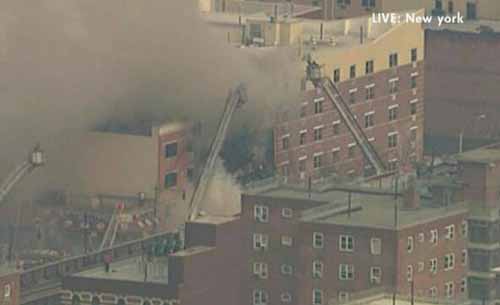
New York, Mar 12: At least one person was killed and 20 others were injured when two buildings collapsed after a huge explosion today in the East Harlem neighbourhood of New York City, sparking a major fire that engulfed the area in thick smoke, officials said.
Police and firefighters are responding to reports of an explosion and collapse of the two buildings around 9 AM on Park Avenue between 114th and 117th streets, the Fire Department said.
NBC New York said one person is dead, 20 injured and several others missing after the explosion shattered windows with a blast that was felt several blocks away.
CNN quoted law enforcement agents as saying that the explosion could be due to a gas leak and do not believe it was terror-related.
City officials said the buildings have been completely destroyed in the explosion. The cause of the apparent blast is not known yet and members of the Joint Terrorism Task Force have responded to the scene out of an abundance of caution, authorities said.
So far, there are reports of 11 minor injuries. The site of the explosion is close to a major commuter rail line that connects New York's suburbs to the city.
Video footage from the scene of the explosion showed heavy smoke rising from the area as firefighters and police reached the spot to put the blaze out. A man who was on the 15th floor of a building on 125th Street told CBS News he saw dark smoke billowing down several blocks.
"The building shook and then we looked to see what was happening. We saw a whole lot of smoke. A lot of smoke came out," witness Samuel Paul said. The city's bomb squad is also responding to the situation as a precaution. Many residents in the neighbourhood reported hearing a loud explosion.
The New York Fire Department said on its Twitter feed that it is responding to a "5-Alarm" fire and "multiple dwelling explosion and collapse" at the building. The city's bomb squad is also responding to the situation as a precaution. The fire department has 39 units and 168 members responding to the explosion that happened at around 9 am.
The building housed a piano store, a Spanish church and residential units.
Federal authorities have not yet commented on the cause of the explosion.
Reported explosion, building collapse in New York City
New York, Mar 12: A building in New York City's East Harlem area collapsed today following an explosion with reports of people trapped in the rubble.
The building collapsed this morning and authorities said they were responding to reports of people trapped in the rubble, according to fire officials.
Witnesses reported hearing what sounded like an explosion before the building collapsed. Flames and smoke could be seen billowing from the street, and video from the scene showed broken windows in neighbouring buildings, the New York Times reported.
The exact location of the building, and the cause of the damage, were unclear.
Dozens of firefighters were working to extinguish the fire as paramedics on the street worked to care for the injured.
Authorities at this time could not confirm reports of any injuries.
The Metro-North service was suspended, officials said, since debris from the building landed on the elevated train tracks on 116th Street and Park Avenue.
Fire officials said that they had reports of a fire and building collapse around 9.30am and were just arriving on the scene. They cautioned that many details remained unclear.
News helicopters showed that the roof of the building appeared to have completely collapsed.




Comments
Add new comment